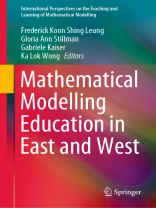This book documents ongoing research and theorizing in the sub-field of mathematics education devoted to the teaching and learning of mathematical modelling and applications. Mathematical modelling provides a way of conceiving and resolving problems in people’s everyday lives as well as sophisticated new problems for society at large.
Mathematical tradition in China that emphasizes algorithm and computation has now seen a renaissance in mathematical modelling and applications where China has made significant progress with its economy, science and technology. In recent decades, teaching and learning of mathematical modelling as well as contests in mathematical modelling have been flourishing at different levels of education in China.
Today, teachers and researchers in China become keener to learn from their colleagues from Western countries and other parts of the world in research and teaching of mathematical modelling and applications.
The book providesa dialogue and communication between colleagues from across the globe with new impetus and resources for mathematical modelling education and its research in both West and East with new ideas on modelling teaching and practices, inside and outside classrooms.
All authors of this book are members of the International Community of Teachers of Mathematical Modelling and Applications (ICTMA), the peak research body into researching the teaching, assessing and learning of mathematical modelling at all levels of education from the early years to tertiary education as well as in the workplace. The book is of interest to researchers, mathematics educators, teacher educators, education administrators, policy writers, curriculum developers, professional developers, in-service teachers and pre-service teachers including those interested in mathematical literacy.表中的内容
Mathematical Modelling Education in West and East.- Computational thinking and mathematical modelling.- Global Understanding of Complex Systems Problems Can Start in Pre-College Education.- Theorizing ‘Modelling as Bridge’ Between Content and Vehicle.- Globalization of Cultural Mathematical Practices through Ethnomodelling.- Positive Deviance in the Pedagogical Action of Ethnomodelling.- Models-and-Modelling Perspective through the Eyes of Jean Piaget.
关于作者
Frederick Leung is Dean of Graduate School, and Chair Professor and Kintoy Professor in mathematics education at The University of Hong Kong. His major research interests are in the comparison of mathematics education in different countries, and in the influence of different cultures on teaching and learning. He is Editor for Springer’s 2nd and 3rd International Handbooks on Mathematics Education and a member of the Executive Committee of ICMI between 2003 and 2009.
Gloria Stillman is an Associate Professor of Mathematics Education at Australian Catholic University (Ballarat). She is a highly experienced Lecturer in primary, early childhood and secondary mathematics education. She has authored many publications on the teaching, learning and assessing of mathematical modelling. She is immediate past President of the International Community of Teachers of Mathematical Modelling and Applications and a former Vice President (Research) of the Mathematics Education Research Group of Australasia. She is a member of the editorial boards of ZDM Mathematics Education and Mathematical Thinking and Learning.
Gabriele Kaiser is Full Professor of mathematics education at Faculty of Education, University of Hamburg. Her research includes modelling and applications in school. She is Editor-in-Chief of ZDM Mathematics Education. She was convenor of the 13th International Congress on Mathematics Education (ICME-13) in 2016 at the University of Hamburg with 3, 500 participants. She is Current President of the International Community of Teachers of Mathematical Modelling and Applications (ICTMA).
Ka Lok Wong is Senior Lecturer in the Faculty of Education at The University of Hong Kong, involved in mathematics teacher education from undergraduate to master’s level. He plays a leading role in various professional development programmes funded by the government. He engages himself in a range of educational communities, including the presidency of Hong Kong Association for Mathematics Education. He was a member of the PISA research study in Hong Kong from 2006 to 2015.












